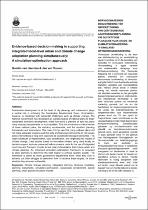 ResearchSpace
ResearchSpace
Evidence-based decision-making in supporting integrated local-level urban and climate change adaptation planning simultaneously: A simulation-optimisation approach
JavaScript is disabled for your browser. Some features of this site may not work without it.
- ResearchSpace
- →
- Research Publications/Outputs
- →
- Conference Publications
- →
- View Item
| dc.contributor.author |
Van Heerden, Quintin

|
|
| dc.contributor.author |
Van Vuuren, J

|
|
| dc.date.accessioned | 2023-06-13T10:19:55Z | |
| dc.date.available | 2023-06-13T10:19:55Z | |
| dc.date.issued | 2022-12 | |
| dc.identifier.citation | Van Heerden, Q. & Van Vuuren, J. 2022. Evidence-based decision-making in supporting integrated local-level urban and climate change adaptation planning simultaneously: A simulation-optimisation approach. <i>Town and Regional Planning, 81.</i> http://hdl.handle.net/10204/12791 | en_ZA |
| dc.identifier.uri | DOI: https://doi.org/10.18820/2415-0495/trp81i1.2 | |
| dc.identifier.uri | http://hdl.handle.net/10204/12791 | |
| dc.description.abstract | Sustainable development is at the heart of city planning, and urbanisation plays a central role in achieving the Sustainable Development Goals. Urbanisation, however, is interlaced with existential challenges such as climate change. The National Government has developed an overabundance of national plans to foster sustainable economic development, which has led to a plethora of acts that place many statutory requirements on municipalities. This article gives a critical review of these national plans, the statutory requirements, and the resultant planning frameworks and instruments. The main findings are that many national plans did not make adequate progress and that acts and planning instruments do not require policy interventions or long-term visions to be tested before being implemented. This might contribute to fragmentation, poor coordination, and neglecting the impact of climate change. Case studies based on simulation models being used locally as decision-support tools are presented before a case is made for the use of Integrated Land Use and Transport models to test policy interventions that include urban and climate planning. An enhanced simulation-optimisation framework is proposed to allow planners to determine the best means to achieve specific targets. This framework is useful as many government departments know ‘what’ they wish to achieve, but often struggle to determine ‘how’ to achieve these targets, let alone whether they are even achievable. | en_US |
| dc.format | Fulltext | en_US |
| dc.language.iso | en | en_US |
| dc.relation.uri | https://journals.ufs.ac.za/index.php/trp/article/view/6972/4646 | en_US |
| dc.relation.uri | https://journals.ufs.ac.za/index.php/trp/article/view/6972 | en_US |
| dc.source | Town and Regional Planning, 81 | en_US |
| dc.subject | Climate change planning | en_US |
| dc.subject | Simulation-optimisation | en_US |
| dc.subject | Sustainable development | en_US |
| dc.subject | Spatial planning | en_US |
| dc.subject | Urban growth simulation models | en_US |
| dc.title | Evidence-based decision-making in supporting integrated local-level urban and climate change adaptation planning simultaneously: A simulation-optimisation approach | en_US |
| dc.type | Article | en_US |
| dc.description.pages | 7-23 | en_US |
| dc.description.note | © Creative Commons With Attribution (CC-BY). | en_US |
| dc.description.cluster | Smart Places | en_US |
| dc.description.impactarea | Urban and Regional Dynamics | en_US |
| dc.identifier.apacitation | Van Heerden, Q., & Van Vuuren, J. (2022). Evidence-based decision-making in supporting integrated local-level urban and climate change adaptation planning simultaneously: A simulation-optimisation approach. <i>Town and Regional Planning, 81</i>, http://hdl.handle.net/10204/12791 | en_ZA |
| dc.identifier.chicagocitation | Van Heerden, Quintin, and J Van Vuuren "Evidence-based decision-making in supporting integrated local-level urban and climate change adaptation planning simultaneously: A simulation-optimisation approach." <i>Town and Regional Planning, 81</i> (2022) http://hdl.handle.net/10204/12791 | en_ZA |
| dc.identifier.vancouvercitation | Van Heerden Q, Van Vuuren J. Evidence-based decision-making in supporting integrated local-level urban and climate change adaptation planning simultaneously: A simulation-optimisation approach. Town and Regional Planning, 81. 2022; http://hdl.handle.net/10204/12791. | en_ZA |
| dc.identifier.ris | TY - Article AU - Van Heerden, Quintin AU - Van Vuuren, J AB - Sustainable development is at the heart of city planning, and urbanisation plays a central role in achieving the Sustainable Development Goals. Urbanisation, however, is interlaced with existential challenges such as climate change. The National Government has developed an overabundance of national plans to foster sustainable economic development, which has led to a plethora of acts that place many statutory requirements on municipalities. This article gives a critical review of these national plans, the statutory requirements, and the resultant planning frameworks and instruments. The main findings are that many national plans did not make adequate progress and that acts and planning instruments do not require policy interventions or long-term visions to be tested before being implemented. This might contribute to fragmentation, poor coordination, and neglecting the impact of climate change. Case studies based on simulation models being used locally as decision-support tools are presented before a case is made for the use of Integrated Land Use and Transport models to test policy interventions that include urban and climate planning. An enhanced simulation-optimisation framework is proposed to allow planners to determine the best means to achieve specific targets. This framework is useful as many government departments know ‘what’ they wish to achieve, but often struggle to determine ‘how’ to achieve these targets, let alone whether they are even achievable. DA - 2022-12 DB - ResearchSpace DP - CSIR J1 - Town and Regional Planning, 81 KW - Climate change planning KW - Simulation-optimisation KW - Sustainable development KW - Spatial planning KW - Urban growth simulation models LK - https://researchspace.csir.co.za PY - 2022 T1 - Evidence-based decision-making in supporting integrated local-level urban and climate change adaptation planning simultaneously: A simulation-optimisation approach TI - Evidence-based decision-making in supporting integrated local-level urban and climate change adaptation planning simultaneously: A simulation-optimisation approach UR - http://hdl.handle.net/10204/12791 ER - | en_ZA |
| dc.identifier.worklist | 26394 | en_US |





